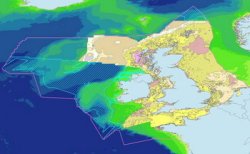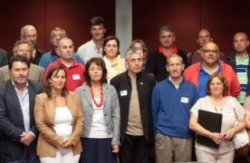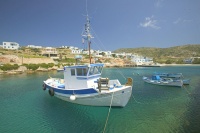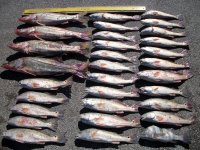Press releases
Commissioner Maria Damanaki

Commissioner Damanaki meets with Alexis Tsipras, President of the main Greek opposition party
31/08/2012
The Commissioner for Maritime Affairs and Fisheries, Maria Damanaki, after her meeting with the President of the main Greek opposition party, Mr. Alexis Tsipras, made the following statement:
"I had the opportunity to inform the President of the main Opposition Party about European issues - the next few months will be very crucial for the euro - and of course about matters regarding Greece.
I also informed him about issues related with maritime growth, the creation of new jobs and fisheries.
I believe that the main opposition party, and all other parties, should play a positive role in the reconstruction of our country."
Journalist’s Question: "As a Commissioner, what is your opinion? How does Europe see the Greek issue? Has the climate changed? Are Europeans positive towards our country or do we have a long distance to cover? Is Europe ready to help Greece?"
Commissioner’s Reply: "I believe that we are doing our utmost in that direction, we are trying hard, but what we need right now are actions, not words. We have reached a point where Greece should act. What we need is results. Unfortunately promises do not count anymore. Precious time has been lost."

Commissioner Damanaki meets with Professor Athanassios Tsaftaris, Greek Minister for Rural Development and Food
30/08/2012
Commissioner Damanaki met with Professor Athanassios Tsaftaris, Greek Minister for Rural Development and Food, to discuss fisheries issues.
Maritime affairs and fisheries

Commissioner Damanaki meets Prime Minister Samaras
30/08/2012
Commissioner Maria Damanaki met with the Greek Prime Minister Antonis Samaras. After the meeting, Commissioner Damanaki made the following statement:
"In the coming months, the Commission will take some very important decisions about the euro, the unification of Europe, Southern Europe countries and of course Greece.
We had a very interesting exchange of views with the Prime Minister Antonis Samaras on these matters.
It is obvious that as European Commissioner and Greek citizen, I will do my best to help in the great effort to rebuild the country and ensure its European perspective.
Regarding my responsibilities, the discussion focused on issues such as the exploitation of maritime wealth, which will be discussed at the next Summit under the Cyprus Presidency.
Our close cooperation will continue and I am sure it will be fruitful."
Commissioner Damanaki also met with Alexis Tsipras, President of the main Greek opposition party.
Commissioner Damanaki met with Professor Athanassios Tsaftaris, Minister for Rural Development and Food, in Athens.
Maritime affairs

Seabed mapping: new opportunities for blue growth and jobs in seas and oceans
29/08/2012
The oceans and seas that surround Europe offer new opportunities for growth and jobs to meet the Europe 2020 goals. To best tap this potential, we need to know more about what is happening under the sea. The European Commission is proposing to create a digital seabed map of European waters by 2020 by collecting all existing data into one coherent database accessible to everyone. In a Green Paper on "Marine Knowledge" adopted today the Commission launches a consultation as to how this could be achieved. It poses a number of questions such as "how can ongoing efforts in Member States be incorporated into a common EU effort?", "how can new cheaper observation technologies be developed?" and "how can the private sector contribute?" The consultation will be open till 15 December 2012.
The new seamless multi-resolution digital seabed map of European waters should be of the highest resolution possible, covering topography, geology, habitats and ecosystems. It should be accompanied by access to timely observations and information of physical, chemical and biological state of the water column, by associated data on the impact of human activities, and by oceanographic forecasts. All this should be easily accessible, interoperable and free of restrictions on use. It should be nourished by a sustainable process that progressively improves its fitness for purpose and helps Member States maximise the potential of their marine observation, sampling and surveying programmes.
Commissioner Maria Damanaki said: "The European economy can benefit from a more structured approach to marine knowledge. This can improve the competitiveness of those working on our seas and coasts by €300 million per year. It can generate new opportunities worth another €200 million a year. The benefits of reduced uncertainty are harder to calculate but we estimate that if we could reduce uncertainty in future sea-level rise by 25% a year, we would save those in charge of protecting Europe's coastlines another €100 million a year. A first set of pilot projects have shown this approach to be feasible. We will build on the lessons learned from these."
Fisheries

EU and Norway to stop discarding in the Skagerrak
29/08/2012
According to a new proposal by the European Commission, the EU and Norway are to harmonize technical and control measures for fisheries in the Skagerrak to ensure long-term sustainability of fish stocks. Significantly, the proposal features an obligation to land all catches of certain fish species – to stop the practice of discarding. The new rules spell out how the ban will work in practice, specifying for instance that undersized fish may not be used for human consumption, except for charitable purposes. The obligation to land all catches will enter into force in two stages: some species (cod, haddock, pelagic species like herring and mackerel) will be covered from 1 January 2013, the rest (mainly flat fish and species like sandeel or Norway pout ) as from 1 January 2015. New technical measures agreed with Norway are also being introduced.
Read more and comment on Maria Damanaki's blog: "Ending discards: we can do it!"

Commissioner Maria Damanaki meets Ana Miranda, Memebre of the European Parliament, and representatives of the Galician small-scale and shellfish sectors
28/08/2012
Commissioner Maria Damanaki met with Ana Miranda, Member of the European Parliament, and representatives of the Galician small-scale and shellfish sectors. Commissioner Damanaki highlighted that numerous measures in favour of small-scale fleets are included under the Common Fisheries Policy reform proposals: for instance, the small scale coastal fleet can benefit from higher aid intensity (75% as opposed to 50% for other beneficiaries) under the future European Maritime and Fisheries Fund and small scale fleets are exempted from several provisions of the control rules (such as logbook obligations) and they are also exempted from the proposed system of Transferable Fishing Concessions.
The current European Fisheries Fund has already supported projects by small-scale fishermen and shellfish gatherers: it supported mariscadoras in the Ría de Vigo and in Costa da Morte FLAG projects to set up a company to develop and market new products from goose barnacles. Support under the future European Maritime and Fisheries Fund will be extended, as it includes, for the first time, those who practice the "pêche a pied" in the definition of fishermen, which will make them eligible for aid foreseen.
Last but not least, the proposal for the new Common Market Organisation includes mandatory labeling information including the "date of catch": this can add freshness value for coastal fisheries.
Commissioner Damanaki also emphasized that the small-scale sector will also benefit from the positive socio-economic effects of restoring and maintaining fish stocks above Maximum Sustainable Yield levels.

Commissioner Damanaki meets with Northern Pelagic Working Group of the European Association of Fish Producers Organisations on mackerel
27/08/2012
Commissioner Maria Damanaki met with representatives of the Northern Pelagic Working Group regarding Coastal States negotiations on mackerel.
The Northern Pelagic Working Group is part of the European Association of Fish Producers Organisations, and represents the pelagic interests of the northern EU Member States.
Commission opens investigation for Spanish aquaculture company
27/08/2012
Spain notified its intention to provide aid to the company Ultracongelados Antartidá, which processes aquaculture products and is part of the Group Pescanova, to modernize its facilities.
The Commission is opening a formal investigation essentially because it has doubts in relation to the compatibility of this type of aid with the internal market in particular when large companies are concerned. Moreover, it is questioned whether the proposed public aid will act as an incentive to the company concerned to make an investment beyond what it would have done even in the absence of State aid. Spain and all interested parties are invited to provide comments on the Commission's position.

Commissioner Damanaki meets Green MEP Nikos Chrysogelos
17/08/2012
Commissioner Maria Damanaki met with Member of the European Parliament for the Greens, Nikos Chrysogelos and his colleagues on the island of Paros in Cyclades. The meeting focused on the topics of illegal use of dynamite for fishing in the area of Cyclades and the need for measures to protect aquaculture and the restoration of fish stocks in the area.
Read more and comment on Maria Damanaki's blog: Fishing Protected Areas in the Aegean Sea

Fishing Opportunities in the Baltic Sea for 2013
17/08/2012
The European Commission today tabled its proposal on fishing opportunities in the Baltic Sea for 2013.
Scientists indicated that more stocks will be fished at Maximum Sustainable Yield (MSY) level in the Baltic Sea. The cuts in TACs adopted in previous years proved to be efficient measure to reach sustainability in the Baltic fishery. The number of known stocks at MSY level could go up from three to six in 2013 if proposed Total Allowable Catches (TACs) are adopted.

Spain's Action Plan to improve fisheries control
03/08/2012
The European Commission adopted an action plan to improve the catch registration system in Spain. It has been designed jointly by the Commission and the Spanish authorities, following two years of system auditing. The agreed measures will help reinforce the fisheries controls by Spain.
Commissioner Maria Damanaki stated: "A robust control system is a prerequisite for sustainability, and improving controls throughout the EU is a high priority for me. I congratulate Spain on the effort they took and hope that other Member States will follow suit. We are already working with them to that end."
Catch data are reported by fishermen so that the control authorities can monitor fishing quotas and prevent overfishing. The Action Plan aims to ensure that the data available to controllers is complete, reliable and timely. It consolidates the measures that the Spanish Ministry for Agriculture, Fisheries and Food (MAGRAMA) started to implement this year, for example setting up of the Fisheries Information System (Sistema de Información Pesquera) and of a Technical Control Group.

Deductions of fishing quotas
01/08/2012
Deductions from 2012 fishing quotas of those Member States that had exceeded their quotas in 2011, were announced today by the European Commission. Through deductions the Commission can immediately address the damage done to the stocks overfished in the previous year and ensure a sustainable use by all Member States of a common fishing resource. This year, for the first time, deductions were increased by 50% for Member States that had repeatedly (in 2009, 2010 and 2011) overfished the same stock.
Commissioner Maria Damanaki stated: "Nobody should harbor illusions that overfishing will be tolerated. The rules which exist should apply to all in a systematic and professional manner. Indeed I intend to use deductions to help achieve the main goal of the Common Fisheries Policy: long-term sustainability of Europe's fisheries."


